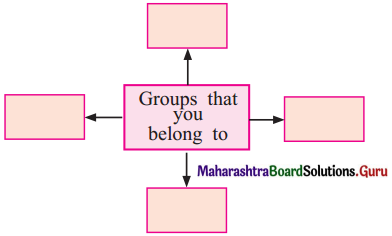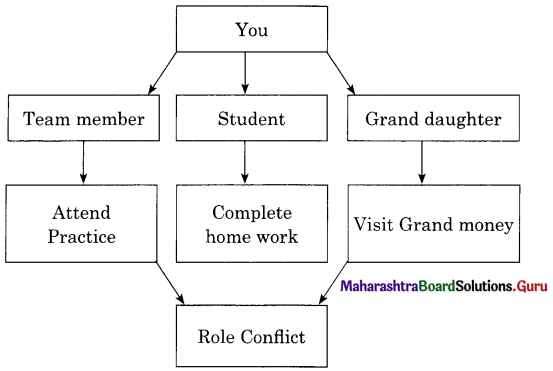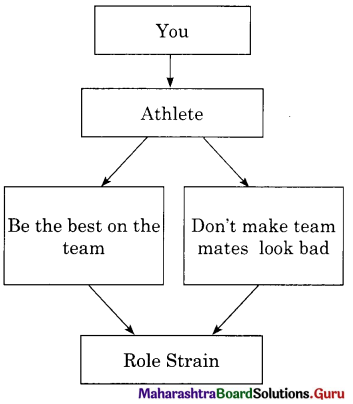Balbharti Maharashtra State Board Class 11 Sociology Solutions Chapter 3 Basic Concepts in Sociology Textbook Exercise Questions and Answers.
Maharashtra State Board Class 11 Sociology Solutions Chapter 3 Basic Concepts in Sociology
1. (A) Choose the correct alternative and complete the statements.
Question 1.
Society is based on ……………….
(co-operation / competition / conflict)
Answer:
Co-operation
Question 2.
Villages are a part of ……………….. community.
(rural / city / metropolitan)
Answer:
rural
![]()
Question 3.
Family is an example of a ………………. group.
(large / primary / formal)
Answer:
primary
Question 4.
Social status refers to ……………… in a group.
(function / position / purpose)
Answer:
position
1. (B) Correct the incorrect pair.
Question 1.
(a) Family – Voluntary Group
(b) Caste – Involuntary Group
(c) Village – Primary Group
(d) Workplace – Secondary Group
Answer:
(a) Family – Involuntary Group
1. (C) Identify the appropriate term from the given options.
(Role, Folkways, Society)
Question 1.
Punctuality in class is the duty of a student.
Answer:
Role
Question 2.
In many places in India, eating with hands is a common practice.
Answer:
Folkways
![]()
1. (D) Correct underlined words and complete the sentence.
Question 1.
Norms which can be applied in daily life are called law.
Answer:
Norms which can be applied in daily life are called standard norms.
Question 2.
Family is an example of a/an voluntary group.
Answer:
Family is an example of a/an involuntary group.
2. Write short notes.
Question 1.
Characteristics of Society.
Answer:
(i) Society includes likeness : According to Maclver ‘society’ means likeness. Social relationships exist among those who are alike in body and mind. People have similarities with regard to their needs aim, ideals, values, outlook towards life and so on.
(ii) Society includes difference : A society together with likeness is also based on differences. Differences is an important factor for a healthy society. Different types of personalities are essential in our society in order to satisfy the different needs. These differences are based on sex, age, physical strength, intelligence, talent, personality and unequal possessions of material objects and wealth.
(iii) Interdependence : Individuals in a society depend upon one another for the satisfaction of needs. One group, one nation, one community depends upon the other for its development, t Interdependence is seen in family groups as well. The existence of society depends upon different types of social relationships.
(iv) Co-operation : Every society is characterized by co-operation and division of labour. It is necessary for survival.
(v) Normative nature : In a society, social behaviour is evaluated by social control. These controlling means are known as norms. Norms control the misbehaviour or the acts which are harmful to society thus protecting the society.
(vi) Society is dynamic : No society is static. It changes continuously; old customs, traditions, I values, norms and institutions replace the new customs, traditions, values, norms and institutions.
![]()
Question 2.
Characteristics of Primary Group.
Answer:
- Physical proximity : This is essential for a primary group as people have close relations with each other. Hence, they experience physical proximity.
- Smallness of the group : These social groups are small in size and bring out the close relations among its members.
- Permanence of relationship : Close relations create more unity among the members.
- Face-to-face relationship : These social groups are small in size and are based on greater closeness. It is useful for maintaining group stability.
- Similar objectives and goals : This group is homogeneous in nature. Hence, there is uniformity of objectives and goals among its members.
- The relationship is an end in itself: The relationships in this group are very natural.
- Informal control: This group is conventional and based on emotional bonds.
Question 3.
Types of Norms.
Answer:
Folkways : The term was first used by William Sumner. According to him, folkways are the recognized ways of behaving and acting in society. Example, eating using one’s fingers, eating with chopsticks, eating with fork and spoon; different ways of wearing a sari.
Mores : Mores are more rigid than folkways. They are instruments of social control and deals with higher values of people. Example, sexual relations before marriage are not permitted.
Law : Law is an important and essential element of society.
They are deliberately formulated rules of behaviour. It is universal in nature and common for all to follow. There are two types of law- Customary Law and Enacted Law.
- Customary law – It is not in a written form but orally transmitted. It is followed in tribal as well as in rural society.
- Enacted law – This law is in a written form. It is important as well as obligatory in a modern, complex and dynamic society. For example, The Hindu Marriage Act, 1955; The Domestic Violence Act, 2005.
![]()
3. Differentiate between.
Question 1.
Primary Group and Secondary Group.
Answer:
| Primary Group | Secondary Group |
| (i) Primary group is a group in which relationships are personal, informal, face to face and intimate in nature. | (i) Secondary group is a group in which relationships are impersonal, formal and contractual in nature. |
| (ii) This group is small in size. | (ii) This group is large in size. |
| (iii) Relationships are personal, so physical proximity is more. | (iii) Due to formal relationships there is no physical proximity between the members. |
| (iv) Relations are permanent. | (iv) Relations are temporary. |
| (v) Behaviour is controlled in an informal way. | (v) Behaviour is controlled in a formal way. |
| (vi) Example Family, peer group, neighbourhood, etc. | (vi) Example Nation, State, Labour unions, etc. |
Question 2.
Voluntary Group and Involuntary Group.
Answer:
| Voluntary Group | Involuntary Group |
| (i) Membership is based on choice. | (i) Membership is based on birth. |
| (ii) It may be temporary or permanent in nature. | (ii) It is mostly permanent in nature. |
| (iii) Individual has choice to continue or to leave the membership. | (iii) One cannot leave the membership or it may be difficult to leave the group. |
| (iv) Example : Political parties, youth organisation, cultural association, etc. | (iv) Example : Family, caste, race, religion, etc. |
4. Explain the following concept with suitable examples.
Question 1.
Reference Group
Answer:
The concept of reference group was introduced by Robert Merton. A reference group is a group to which an individual or another group is compared. We use reference groups in order to guide our behaviour and attitudes that help us to identify social norms.
Reference Groups are of two types Informal and Formal.
- Informal reference groups are formed by the individual as per their likes, interests and attitudes.
Example : Family, peer groups, teachers, siblings, associates, etc. - Formal Reference Group are the ones that have a specific goal or mission.
Example : Labour unions, supreme court, military units, corporations, worship place, universities, etc.
Question 2.
Role Conflict
Answer:
- Role conflict refers to a clash between roles.
- When one faces incompatibility between two or more roles at the same time or in a given situation. Role conflict is inevitable.
Example: A boss will suffer role conflict if forced to fine an employee who is also a close friend. A newly married bride experiences role conflict because she has to adjust with her in-laws, household work and office work.
![]()
5. (A) Complete the concept maps.
Question 1.

Answer:

5. (B) State whether the following statements are true or false with reasons.
Question 1.
Society never changes.
Answer:
This statement is False.
1. Society is a web of social relationships. These relationships and interactions are based upon different institutions, traditions, customs, values and norms of the society.
2. Changes in any one of this is reflected in the changes in relationship and interaction among the individuals. Change is a universal phenomenon. No single society is static. Factors like, westernisation, modernisation, industrialisation, education have brought various changes in society.
3. Today, educational system, family patterns, norms, values, needs, etc., are changed. People have become more self-centred. Individual freedom, consciousness towards one’s own rights are increasing. Hence, society is changing continuously.
Question 2.
People living in a community must have awareness of sharing a way of life.
Answer:
This statement is True.
- Individuals are emotionally attached to their community. People those who live in a particular community occupy a definite territorial area. They share common objectives and needs.
- They have love and affection towards each other.
- This develops a sense of belongingness. Therefore, people living in a community must have awareness of sharing a way of life.
6. Give your personal response.
Question 1.
Show how folkways, mores and laws may clash with each other.
Answer:
Folkways is one of the essential elements of culture. Folkways govern our daily routine and ordinary contacts with other people. Whereas mores are considered as vital to the welfare of the group. Folkways and mores are the customary way of life and standards of right and wrong. Example: wearing clothes are mores and wearing clothes of different styles are folkways.
Laws are deliberately formulated rules of behaviour that are enforced by a special authority, e.g., there are laws that can punish people for marrying more than one person. Hindu Marriage Act, 1955.
Mores, folkways and laws are taught through the process of socialisation by various sources like family, friends, peer groups, schools, etc. However, these three clash each other in various ways. In today’s complex, competitive society, one finds it difficult to cope up with these three elements of society. Example: there is a man who belongs to a poor family and has the responsibility of marriage of his sister. Being born in a poor family, he doesn’t have enough money for his sister’s marriage. As per the laws, asking for dowry is illegal, but due to his financial condition, he has to ask for dowry from his in-laws to get his sister married. In such situation folkways, mores and law clash each other.
![]()
Question 2.
Do you think that role conflict is inevitable in social life?
Answer:
Yes, the role conflict is inevitable in social life.
When an individual has to play several roles at a time, then it is not possible to perform one role appropriately, it is called as role conflict. In today’s society, everyone wants to achieve high status in society. Everyone wants to achieve a life of luxury and comfort. People want to earn more and more money. Expectations have been increased. In order to adjust with such competitive situation, one has to play different role in the society. That creates role conflict.
Example: A woman working as a nurse in the hospital, has to look after her sick in-laws at home, because of which she can’t pay proper attention towards her duty. A husband who has to attend urgent meeting as a manager, can’t give time to his family. One has to perform multiple roles in a complex society. That is why role conflict is inevitable in social life.
7. Answer the following in detail (About 150-200 words).
Question 1.
Identify any two secondary groups of which you are a member. Discuss any four characteristics with reference to the groups that you have named.
Answer:
Secondary groups have impersonal, formal, indirect, temporary and goal oriented relationships with large number of members. It is not possible to have regular, permanent, close and intimate relations with everyone. People meet each other only for serving specific purposes. Relations are maintained only when the specific purposes are fulfilled and people are satisfied.
People are always very busy and it is necessary to have appointments before meeting. Secondary group are heterogeneous and formal in natural. People are given time to meet but for that purpose only. People do not meet for long term goals. Free expressions of emotions, feelings and intimacy is not allowed. In secondary group, members have to follow rules and regulations strictly.
Example : (i) Student of a college
(ii) Member of NSUI – National Students Union of India (or) ABVP – Akhil Bhartiya Vidhyarthi Parishad
Characteristics of secondary group with reference to the above mentioned group. Large Size: In college or in NSUI number of students and members is large. Here, the membership is unlimited as compared to primary group.
Indirect relations : Due to large size, direct relations among all the students and members are not possible. To convey any message, we take help of modern means of communication, e.g., mobile phones, e-mail, WhatsApp, etc.
Impersonal relations : As the members are large in size personal interactions is very rarely seen. Here, we do not know each other personally. That is why, relationship is not personal.
Formal relations : Informal relations is not possible because face to face contact can’t take place. People are more goal oriented. Membership is strictly based upon laws and regulations.
![]()
11th Sociology Digest Chapter 3 Basic Concepts in Sociology Intext Questions and Answers
ACTIVITY (Textbook Page No. 25)
Question 1.
Visit a rural, tribal or urban community and speak to 3-5 people and find out about their work, families, customs, beliefs etc. Write a report or make a short film on your mobile phone.
Answer:
Tribal, Rural and Urban Community – Work, Families, Customs, Beliefs-
(i) The Tribal Community : The tribal community is small in size. Each tribe has its own culture. They are close to nature and their life is influenced by religion. Therefore, they worship natural forces and seek assistance from the shaman and magician for solving their problems. Their economy and usage of technology is simple. This is known as subsistence economy.
(ii) Rural Community : The rural community is largely homogeneous. The main occupation of the people in this community is agriculture and non-agricultural occupations such as dairy farming, poultry, etc. This community is influenced by nature and they worship it as God or Goddess.
The rural community is influenced by the institution of family and characterized by primary relations. Joint family continues to exist in rural areas though some modification has occurred.
(iii) Urban Community : The urban community is large in size and consists of mostly nuclear families. It is a settlement of socially heterogeneous people. Occupations of the urban people are non agricultural. There is more scope for division of labour. This community is greatly impacted by artificial or man-made environment rather than natural environment on the urban community.
Question 2.
Prepare a photo essay regarding interactions observed within primary and secondary groups. Students should go around in their neighbouring localities and capture with their devices (like mobiles), the interaction patterns based on characteristics of various types of groups. How to write a photo essay? (Textbook Page No. 29)
Answer:
(Students are required to perform this activity themselves by visiting the link http://www. collectivelens.com/blog/creating-photoessay/ as a guideline.)
![]()
Question 3.
Conduct a role play exercise to understand the concept of role conflict and role strain. For example: Working women performing various roles inside and outside the home. (Textbook Page No. 32)
Answer:
Understanding 1: Women consider that the household affairs and care for the family is their primary duty. Women are thus confronted with the challenge of playing the dual role, to excel at home, as well as at the workplace. To prove her competence on both the fronts, women are facing the problem of overwork and are often being stressed or drained of their energy. Yet, they find themselves unable to match the expectations at any of the two places, which gives rise to role conflict and role strain.
Understanding 2:
Role Conflict:
Role conflict occurs when conflicting expectations arise from two or more statuses than an individual occupies.

Role Strain:
Role strain arises when conflicting expectations are built into a single status.

Question 4.
List out various folkways and mores that we find in our day-to-day lives. (Textbook Page No. 33)
Answer:
Folkways: The folkways are the recognized ways of behaving and acting in society. Folkways are norms that stem from and organize casual interactions and emerge out of repetition and routines. We engage in them to satisfy our daily needs and they are most often unconscious in operation, though they are quite useful for the ordered functioning of the society.
- Waiting in a queue
- Appropriate dressing.
- Practice of raising one’s hand to take turns while speaking in a group.
- While eating using one’s fingers, eating with chopsticks, eating with fork and spoon.
- Different ways of wearing a sari.
Mores : “More are the popular habits and traditions when they include a judgment that are conductive to social welfare and when they exert a coercion on an individual to conform to them”.
More are stricter than folkways, as they determine what is considered moral and ethical behaviour. Mores structure the difference between right and wrong. Violation of mores results in disapproval or ostracizing. As such mores play a key role in shaping our value, beliefs, behaviour, and interactions than folkways.
- Religious doctrine.
- Sexual relations before marriage are not permitted.
- It is not acceptable to use drugs such as heroin and cocaine.
- It is expected that one will be one time for work.
- Talking to oneself in public is not considered normal behaviour.
- Nudity in public is not acceptable.